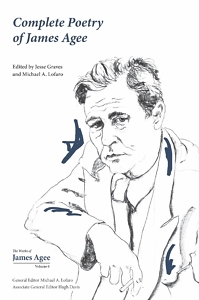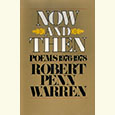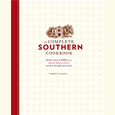Hometown Literary Hero
A new collection of James Agee’s poetry displays the writer’s range and ambition
Pulitzer Prize-winning author James Agee is best known for his novels and screenplays, but a new volume from The Works of James Agee series restores his reputation as a poet. Complete Poetry of James Agee includes the writer’s earliest publication, Permit Me Voyage, as well as the scant number of poems that were published in magazines and journals during Agee’s lifetime. It goes beyond this meager offering, though, to include hundreds of never-before-seen works that demonstrate Agee’s impressive output.
 Editors Michael A. Lofaro and Jesse Graves acted as detectives as much as curators and critics, hunting down manuscripts and deciphering handwritten lines. In fact, their story of creating this book would make a fine screenplay itself.
Editors Michael A. Lofaro and Jesse Graves acted as detectives as much as curators and critics, hunting down manuscripts and deciphering handwritten lines. In fact, their story of creating this book would make a fine screenplay itself.
Lofaro is quick to dispel the notion that this project began as a labor of love, explaining that he advised the University of Tennessee not to buy two boxes of Agee manuscripts in 1988 because the exorbitant price did not include the right to publish the work. However, he took up the campaign to secure publishing rights from the Agee Trust, going so far as to pose as a caroler on one particularly memorable trip to New York City. His efforts were unsuccessful until a change of leadership at the trust. The restoration of Agee’s literary standing has now been a decades-long project for Lofaro.
“I won’t see the end of it,” Lofaro predicts, acknowledging the prodigious amount of material that Agee produced in his 45 years. “The breadth is astounding.” Complete Poetry of James Agee is Volume 6 of the series, but even on its own, this tome displays the writer’s range and ambition.
In a letter to his mentor Father James Harold Flye, Agee described his intention to create what he called an “amphibious style.” He wrote, “What I want to do is devise a poetic diction that will cover the whole range of events as perfectly and evenly as skin covers every organ, vital as well as trivial, of the human body.” Graves cites this letter in his exceptional introduction to this volume, where he weighs Agee’s varied styles and subjects. He finds a thread running through Agee’s work; that is, a desire to recognize “truth beneath the façade.”
In my conversation with the two editors, Lofaro refers to Agee’s political work, including his 1945 cover story for Time about the atomic bomb, as “staggeringly prescient.” In his poem “Eureka,” Agee displayed a dark sense of humor as he poked fun at the dangerous rise of nationalism in the 20th century: “We can prop the crumbling state / “By properly directing hate.” When I remark that Agee’s political poems feel timely, Lofaro says, “Mankind hasn’t changed enough …. We’re still dealing with some of the same issues.”
Lofaro is the general editor emeritus of The Works of James Agee and a professor emeritus in the English Department of the University of Tennessee, Knoxville. Graves is now a professor at East Tennessee State University and the author of five poetry collections himself, but his journey with Agee began when he was Lofaro’s graduate assistant. “Those are some of the best afternoons I ever had in school,” Graves says, calling the process an adventure. “I’ve always thought of Agee as my hometown literary hero,” Graves adds, referencing the writer’s Tennessee roots.
While Agee’s New York City exploits are memorable — including the time he hung from the 50th floor of the Chrysler Building for inspiration — he hails from Knoxville. Graves acknowledges that Tennessee rarely appears in his poetry, but one of Agee’s most enduring and accomplished poems, “Ann Garner,” features a decidedly Appalachian setting. This narrative poem, written in skillful blank verse, follows the life of a woman who births a stillborn child. The loss haunts her and eventually transforms her into something almost supernatural, a person powerfully in tune with the earth.
At one point during our conversation, Lofaro holds up all of the previously published Agee poems, two slim volumes that would disappear on a bookshelf beside this new edition. Lofaro and Graves combed through countless pages of handwritten verse, sometimes using magnifying glasses to decipher Agee’s words. Both editors describe the experience with awe. “The hairs on the back of your neck start standing up sometimes,” Graves says.
The care these editors took with Agee’s work is apparent in the attention to detail. Lofaro includes copious annotations, helping make sense of historical and idiomatic references that might elude a modern reader. Both Graves and Lofaro admire Agee’s proficiency in classic poetic forms, as well as his later attempts at more fluid, experimental styles. Perhaps Lofaro’s involvement with The Works of James Agee didn’t begin as a labor of love, but it feels that way now.
This new volume shows how important poetry was to Agee throughout his brief life. In Lofaro’s words, Agee “never stopped being a poet, ever.” And Graves hopes for readers to find their own favorite poems. “Agee can meet them most anywhere,” Graves says. This reflection on the writer’s scope speaks to what’s special about Complete Poetry of James Agee. At more than 600 pages, the book might seem intimidating at first, but there’s something for dedicated fans and newcomers alike.

Erica Wright is the author of four crime novels and two poetry collections. Her essay collection Snake was released in 2020, and Hollow Bones was recently published by Severn House. Wright grew up in Wartrace, Tennessee, and now lives in Knoxville.


